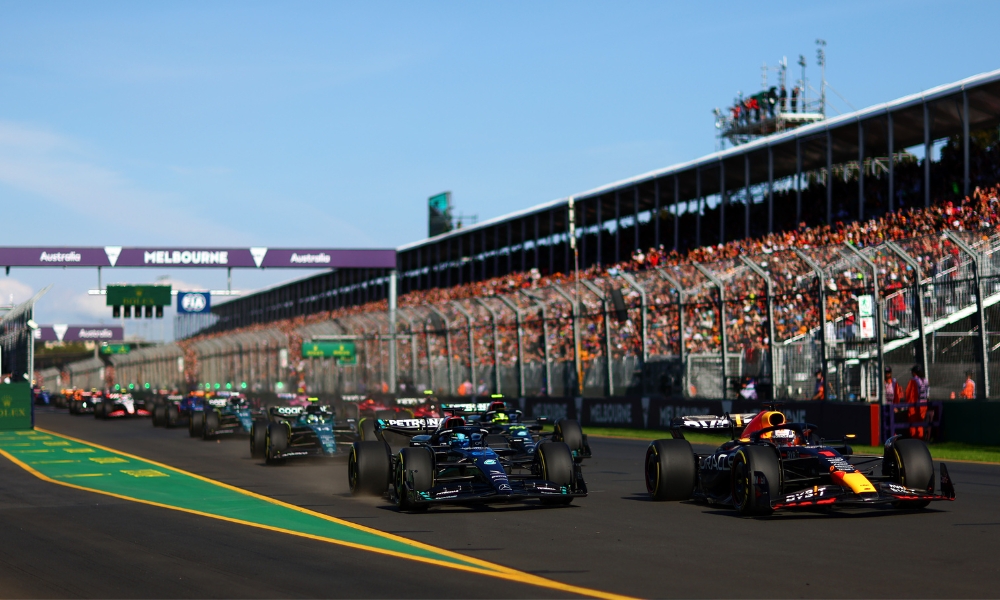- Separate qualifying session for sprint to be held on Saturday
- Decision needs to be confirmed ahead of Azerbaijan GP
Formula One teams have reached an agreement over a new weekend format for its sprint events, according to RacingNews365.com.
Before last weekend's Australian Grand Prix, reports emerged that teams were in discussions to alter the schedule at the first sprint race of the season in Azerbaijan.
The format used since the first sprint event, held in 2021, is to run practice and qualifying on the Friday, and then hold a second practice session on the Saturday before the sprint race. The Grand Prix holds its traditional Sunday slot.
The issue for teams is the second practice session on the Saturday. This session has become increasingly redundant due to regulations restricting teams from making setup changes following qualifying.
Under the new agreement, there would just be one practice session held on the Friday, which would then be followed by qualifying for Sunday's main race. The Saturday morning practice session would be replaced with a second qualifying session, this would only decide the grid for the sprint race.
Before, the finishing order of the Saturday sprint would decide the grid for Sunday's race. This led to conservative driving as teams did not want to risk starting towards the back of the grid for very little reward.
If these discussions come to fruition, it would further entrench Formula One in the direction of competitive action on every day of the race weekend. Prior to the Australian Grand Prix, Formula One chief executive Stefano Domenicali told Portuguese TV he was “a supporter of the cancellation of free practice sessions”.
Organisers have wanted to trim practice sessions for some time, with the move to more competitive action meaning race promoters and broadcasters will benefit financially. The short-term benefits of giving fans more reasons to either attend full race weekends or tune in on Fridays and Saturdays are obvious.
There are still hurdles to overcome before the decision is ratified though, and any modifications required by the teams would need to be verified by Domenicali, the Formula One Commission and the International Autosport Federation (FIA).
There is support from drivers for the move, with both George Russell and Lando Norris saying that three practice sessions is too much for Formula One. In both instances, they called on this time to be used better in supporting young drivers' track time in Formula Two and Formula Three. From 2024, more track time will also need to be found for the all-female F1 Academy.
However, reigning world champion Max Versappen disagreed. He said: “I'm not a fan of how many races we do nowadays and I'm not a fan of changing the whole format [without practice sessions] either. They have to be careful not to change the whole DNA of Formula One.
“I do think it's important that they don't play with that too much, because then of course at one point it stops. The way I used to watch Formula 1 when I was younger, I really liked it, looking forward to the race on Sunday. When you do so many races as we do nowadays maybe you can cut out one practice session, but other than that, I don't think you need to change many things.
“The only thing you have to look at is making the field closer, so the gaps between all teams, which leads to more exciting racing in general.”
BlackBook says…
The financial benefits to race promoters and broadcasters are clear in the short term, but is Formula One taking a risk with its product? An already bloated season with more on-track action could see fans reach saturation point.
There is also the knock-on effect for teams, as more competitive action increases the risks of costly crashes. With a budget cap in place, teams can ill-afford expensive repair bills. Christian Horner, Red Bull team principal, has been vocal in his criticism of the decision to hold the first sprint event of the season in Azerbaijan, a historically chaotic venue for the sport.
In Formula One's quest to milk the series for every last dollar, organisers need to be careful to not lose the essence of what makes the sport so special.

